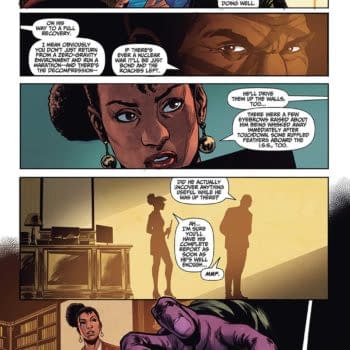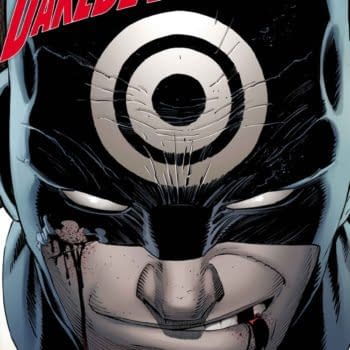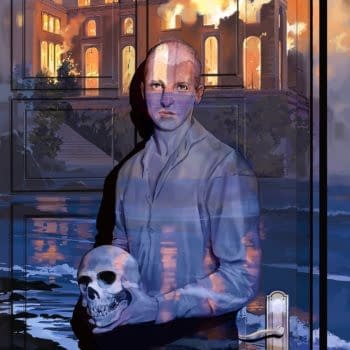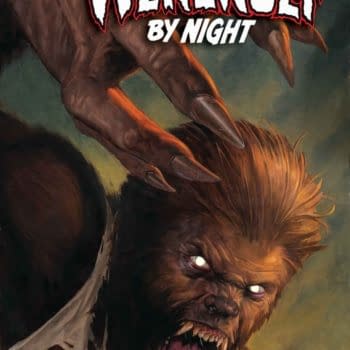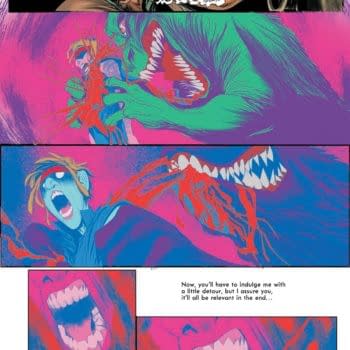Posted in: Comics, Recent Updates | Tagged: Andrew Robinson, Apple Corps, brian epstein, Cilla Black, dark horse, john lennon, paul mccartney, ringo starr, The Beatles, the comics journal, The Fifth Beatle, Transmedia, vivek tiwary, Yoko Ono
Vivek Tiwary's Odyssey Writing The Fifth Beatle Graphic Novel And Film – Look! It Moves! By Adi Tantimedh
By Adi Tantimedh
The Fifth Beatle, a biography of the short life and career of the band's manager Brian Epstein, is one of the graphic novel highlights of this year, a labor of love by author Vivek Tiwary. When a mutual friend introduced us and insisted I interview him, I could hardly say no. After all, the book had reached No. 1 on the New York Times Bestsellers List and the movie version had been announced. Tiwary, a New York-based film and theater producer who previously brought Green Day's American Idiot to Broadway, had written both the graphic novel and the screenplay concurrently, so we had a lot to talk about.
"I grew up loving The Beatles," he said. "I was at the Warden School of Business 21 years ago. That's when I started researching Brian Epstein's life. I was a business student looking for some inspiration, wanting to work in the entertainment industry, and I thought, 'If I'm going to enter this industry, I should study the lives of the great entertainment visionaries.' Believing that Brian and The Beatles were the ones that wrote and rewrote the rules of the entertainment business, I thought I should study the life of Brian Epstein.
[youtube]http://www.youtube.com/watch?v=EexV5M-DPso[/youtube]
"So 21 years ago, there were no online resources, there's no Wikipedia, there's no Youtube, there's none of that. There are no books in print about Brian Epstein other than The Fifth Beatle. We are the only one. 21 years ago, there were not a whole lot available about Brian Epstein. I was a little perplexed by this. I literally was able to find a book about John Lennon's astrologist, and I couldn't find a book about the guy who discovered the band and led them from obscurity to superstardom. So it became a little mystery that I became rather obsessed with uncovering. I did uncover this amazing business story, which is what I initially was after. How did he get the band a record deal when no one wanted to sign them? How did he come up with the suits and the haircuts and the performance-ending bows, which is basically their packaging, their presentation? How did he compare and contrast with Colonel Tom Parker, who was the other great manager at the time – he managed Elvis Presley?"
Adi Tantimedh: That was funny, because you so clearly portrayed Colonel Tom Parker as EVIL.
Vivek Tiwary: He was a dark man, yeah! He was vampiric, which is why we portrayed him a little bit like a vampire. So that was the story I was after, and as you see, it's in the book. It's a fascinating story, I find it an inspiring business story, and if you're a Beatles fan, it's a particular treat. Some of the nuances of that story had never been told before. However, what really attracted me to the Brian Epstein story was the human side. He was gay at a time when it was literally against the law to be gay, he was Jewish at a time when there was rampant antisemitism in the country, he was from Liverpool, at a time when Liverpool had no cultural influence. So essentially you had this gay Jewish man running around Liverpool saying "I FOUND A LOCAL BAND! AND THEY'RE GOING TO BE BIGGER THAN ELVIS! THEY'RE GOING TO ELEVATE POP MUSIC TO AN ARTFORM!"
These were crazy things to say, but he had this spectacular dream, he worked doggedly for it, he wouldn't take "No" for an answer, and at the end of the day he realized it, and the world got The Beatles. That to me is an incredibly inspiring human story. I hasten to add that in my life, I never had the obstacles that Brian faced. I don't want to claim we had similar struggles, however I can still emotionally relate to what he was going through. I'm a first-generation American. My parents are from Guyana, South America, by way of India. You just don't see a lot of people of my background working in fields like graphic novels, film, television, etc. There is Bollywood, which is a very specific thing, but outside of that, people of my ethnicity are steered towards Medicine, Engineering, Technology, straightforward Business. We don't go into Entertainment and the Arts.
AT: It's the Asian thing.
VT: Yeah, that's it. And I'm not the only one, but there are not many of us. So I could really relate to that aspect of Brian's struggle and the idea of chasing a dream and a big ambition against all the odds with a ton of people telling you that you're crazy and that dream is crazy an that people like you don't do these sorts of things. So I find the human side of his story incredibly inspiring, and that's why I carried the Brian Epstein story inside of me, and because it's been so inspiring in my career, I felt I should tell it. Here's the guy who gave the world The Beatles, arguably one of the greatest cultural icons of all time and nobody knows anything about him, and his story is inspiring. So I felt in part I'm righting a wrong by trying to sing the song of this unsung hero, giving Brian the credit he deserves. I also feel that if people knew the story they would be inspired by it and perhaps Brian's life will encourage people to chase their dreams the way it inspired me to chase my dreams. I think that's worth it; that's why I felt the urge to tell the story.
AT: There are interesting layers to the book: one is it's a story of pioneering a form of branding. He branded The Beatles. Without him, they would have just been a bunch of guys out of their teens playing underground clubs. He molded their image, he created the brand for that image, and then he worked his ass off to get them noticed, to get them airplay.
VT: And this is at a time where branding wasn't a business touchstone. People didn't talk about branding. "What's that?" Certainly not branding for a rock band!
AT: And he had toys and the cartoon show… that's essentially what everyone now calls 'transmedia'. He was one of the first people who actually did that. Tom Parker didn't really do that. Tom Parker just shoved shoved Elvis into movies just because it got him more money.
VT: You're absolutely right. Now Elvis is so incredibly merchandised, but people don't realize that Brian and The Beatles were the first ones to do that. Elvis' merchandising came after The Beatles. The first band to have merchandising outside of simple T-shirts was The Beatles due to Brian. If bands made T-shirts in the 1960's, they made them for promotion. It never occurred to them you could make money off of merchandise. People often point to merchandise as one of Brian Epstein's business failures because they say he was getting 10-20 percent when it he should have been getting 80-90 percent. That may be true, but he pioneered it. At the time when he cut those deals, nobody had heard of a merchandise deal!
AT: You had scenes where he says he feels guilty for only getting 10%.
VT: And looking back on it, he realized that he made a mistake. He didn't even want The Beatles to know about his mistake. He wanted to fix it without them ever hearing about it.
AT: What's really interesting is that his campaign to brand them and have them break out in different mediums came from a place of sincerity. He genuinely believed and cared for and loved the product, and he wanted everyone to love the product as opposed to certain conglomerates and corporations who are cynically trying to brand products these days in the hopes that kids or whatever target demographic might love it when the product might be cynically made.
AT: Now, there's another layer to the story, which is, as you portray it in the graphic novel, that Epstein turned managing the band into a way of expressing his creativity. It felt like as a middle-class Jewish gay man, he didn't have many outlets until he found this band. He felt he could express his love of clothes, of music, of fashion, and you draw on the analogy of the matador bullfighting as a motif that runs through the book.
AT: At the same time, there's the tragic part of his life, which is that he still couldn't express his sexuality. That was the one component that was missing.
VT: Yeah, I don't want to sugar-coat it too much. I do find it an incredibly inspiring story, but I also find it a tragic story. He died at the age of 32 having unleashed on the world this great message of Love, yet to use a Beatles reference, he had to hide his own love away. That's the tragedy of the Brian Epstein story but shining through it is the story of a guy who triumphed over all these odds and realized some beautiful dreams to the benefit of all mankind. I know that sounds awfully cheesy, but I really believe that.
AT: There's another aspect, which is that here he is, from a Jewish, middle-class, aspirational family, coming across these working-class artists and deciding he's going to elevate them, and in doing so, they elevate a lot of people. It's an instance of class unity.
VT: Part of why being from Liverpool was a strike against them was that people from London, which is where the Music Industry was headquartered, looked down on people from the North. They were considered lower class. They still do to some degree, but certainly there have been a ton of artists from Liverpool, Manchester, but at the time, nobody looked to the North for music.
AT: And this little footnote that you put in that's probably more resonant to British readers than Americans, is the fact that Brian Epstein also picked up Cilla Black.
VT: Yes. There's only so much we could tell and I wanted to keep to 130 pages so I didn't have time to get into it, but he absolutely discovered Cilla Black. Much like he said The Beatles were going to be bigger than Elvis, he believed Cilla Black would one day be a big television personality. He was right about that. She had her success as a musician, but she maintained her celebrity profile through being a television personality. He knew what he was doing. He certainly knew what he was doing.
AT: So how did you decide on the 130-page count for the book when it could have gone longer or shorter?
VT: We were never strict about the page-count as to be so strict. I basically wrote it to be as long as it was going to be. However, I wanted it to be something you could read in one sitting, depending on how fast you could read, to be able to finish it in about two hours. I have an ungodly amount of knowledge in my head about Brian Epstein, having researched this literally for more than half my life, in 21 years. I could certainly have written a 400-page prose book about Brian, but to me, a 400-page book about the manager of The Beatles doesn't sound like a lot of fun.
It would be fun for me as a Beatles geek and other Beatles geeks out there, but I want something that's an enjoyable read, and I find the medium of graphic novels, which I love, is enjoyable. I wanted people who aren't necessarily hardcore Beatles fans, who aren't necessarily interested in the behind-the-scenes business of The Beatles, to flip through it, see the gorgeous art by Andrew Robinson, to hear the book might be getting good reviews, and it's 130 pages, a quick read, maybe they'll give it a shot. That was important to me. I wanted the story to be accessible. The graphic novel medium makes it more accessible. Keeping the page count manageable would make it accessible as well. Anywhere between 100 and 200 pages was what we were going for, and the 128 pages was where it came down.
AT: And you keep it moving at a certain pace and also touch upon the difficult parts of Brian Epstein's life. I notice that The Comics Journal review liked it but said you glossed over the firing of Pete Best and the hiring of Ringo Starr, which Best wrote a book about.
VT: I actually replied to that. It's not that I ignored the stories, it's that we wanted to keep the book to a trim level, and the Pete Best story is going to be in the film. People in marketing will call it an adaptation. However, the way I look at it, it's an expansion. So if you love The Fifth Beatle, you should see the film and read the book, then you'll get a bigger picture of Brian's story, because there are stories in the film, like the Pete Best story, that aren't in the book because I couldn't fit it in the book. And there are stories in the book that aren't in the film. I wanted the two to be companions to each other as opposed to being a storyboard for the film.
And if I may, I love The Comics Journal, but that reviewer had misinformation. He said I whitewashed the ending of Brian's life, but the way that he reported it was inaccurate. That's part of why I wanted to tell the story. Most people look at what happened in the press and what other people have read and when it came to Brian's death, I actually spoke to the coroner, I spoke to the woman who knocked down his door with the police. This ending of the book may be contrary to what other people think they know, but this is the real deal. This is why I wanted to tell the story.
AT: You also left it open enough to not be an outright tragic story. There are already tragic parts of it you touch upon, like how he was extremely anxious about his life and sexuality and suffered from depression, and that led to his addiction to the drugs that eventually killed him. You could almost read it as his coming from a middle-class, aspirational background might have added to his sense of repression, since he was never truly comfortable in his own skin, which led to him looking for love in the wrong places, like when he tried to pick up rough trade and got the hell beaten out of him, and then his mistake of falling in love with a hustler he had been warned about, who ended up blackmailing him.
VT: You have to keep in mind in the 1960's in the United Kingdom it was against the law, so if he was repressed, he had to be or he would have been thrown in jail. He lived his entire life in fear of his sexuality. Part of the tragedy of his story is that as he got more successful, as The Beatles became more successful, his life and his homosexuality became more dangerous because he was thrust into the public eye. He became a true public figure and he was concerned as he achieved more and more success for his clients, he ran more and more the risk of getting thrown in jail, so there's no question that class and ambition were deeply tied to his sexuality because they had to be. His ambition and rising stature in the world were tied to his public persona which was tied to this dangerous risk of his homosexuality being revealed.
AT: Now since you were dealing with real life figures, did the script have to be vetted by lawyers?
VT: Not so much, actually, because you're dealing with public figures. It's like writing a biography. If you don't have endorsements from the people who are in it, you open yourself up to either slander or libel or I don't know the exact technical terms. I can back up all the research I've done, so even the parts that may upset someone, with all due respect, are true. Everything I've written is backed up by research, and as such it's protected. It's a biography. So I didn't really need any permissions in that sense. You do, however, need permission to print song lyrics and most importantly permission for music in the film. And I'm very proud to say we got access to Beatles music. I got the sign-off from Paul McCartney, Ringo Starr, Yoko Ono, and Olivia Harrison, which came down to Apple Corps, the Beatles company, which allowed us to do a deal with Sony ATV, which controlled the music publishing, which is a very longwinded way of saying we have access to Beatles music for our film. That is unprecedented. We are literally the first film about the band ever to have gotten access to Beatles music.
AT: One final question: how many of the real-life people in the story have read the graphic novel?
VT: All of them with the except of Sid Bernstein and Natt Weiss, who were two of the people that I spoke to most often about this project – they were both New Yorkers and so I got very close to them – unfortunately they passed away just a few months ago. We lost them before the book was out and they had a chance to read it. Natt was Brian's best friend and closest confidante. He and Brian were never lovers but he was gay and so he was very illuminating about the struggles Brian faced with his homosexuality and then there was Sid Bernstein, who was the famous concert promoter who brought The Beatles over to the United States and he was Jewish. He was very illuminating about Brian's struggles and feelings around his Judaism and the anti-semitism that he faced.
Those two guys were wonderful to me and I'm very sad that they didn't live to see the book published and go to No. 1. But everyone else has seen this book. I got a lovely note from Joanne Peterson who was the inspiration for Moxie. I got a note from Joanne Epstein, who is a member of the Epstein family. They've all seen it, and I'm happy to say that everyone I've sent it to has responded enthusiastically. Andrew Loog Oldham, who was the manager of The Rolling Stones and a friend of Brian's, wrote an introduction for us, so he is another person I'm very honored to have an endorsement from. Billy J. Kramer also wrote an introduction for us. He was one of Brian's management clients back in the 1960s. Billy loved the book and has endorsed it. We're getting a lot of thumbs-up from the right folks. So even though I wasn't there – I was born in 1973, I feel pretty confident that we've done Brian's story, not just his life but his life and times, correctly.
Yeah yeah yeah at lookitmoves@gmail.com
Follow the official LOOK! IT MOVES! twitter feed at http://twitter.com/lookitmoves for thoughts and snark on media and pop culture, stuff for future columns and stuff I may never spend a whole column writing about.
Look! It Moves! © Adisakdi Tantimedh














